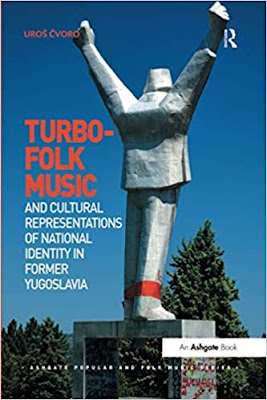Turbo-folk | Турбо-фолк
Турбо-фолк – специфическое позднеюгославское (и пост-югославское)
явление. Это дух и признак эпохи как, к примеру, постсоветский шансон
или же «русский рок». Это музыка, под которую разваливалась и воевала
между собой Югославия, это воевавший за боснийских сербов Роки Вулович и жена сербского гангстера/парамилитария/военного преступника/народного героя Желько «Аркана» Ражнатовича певица Цеца, это любовные и военные песни, это дискотеки, рестораны и окопы.
Исследование по теме:
Uroš Čvoro. Turbo-folk Music and Cultural Representations of National Identity in Former Yugoslavia
 Turbo-folk music is the most controversial form of popular culture in
the new states of former Yugoslavia. Theoretically ambitious and
innovative, this book is a new account of popular music that has been at
the centre of national, political and cultural debates for over two
decades. Beginning with 1970s Socialist Yugoslavia, Uroš Čvoro explores
the cultural and political paradoxes of turbo-folk: described as
’backward’ music, whose misogynist and Serb nationalist iconography
represents a threat to cosmopolitanism, turbo-folk’s iconography is also
perceived as a ’genuinely Balkan’ form of resistance to the threat of
neo-liberalism. Taking as its starting point turbo-folk’s popularity
across national borders, Čvoro analyses key songs and performers in
Serbia, Slovenia and Croatia. The book also examines the effects of
turbo on the broader cultural sphere - including art, film, sculpture
and architecture - twenty years after its inception and popularization.
What is proposed is a new way of reading the relationship of
contemporary popular music to processes of cultural, political and
social change - and a new understanding of how fundamental turbo-folk is
to the recent history of former Yugoslavia and its successor states.
Turbo-folk music is the most controversial form of popular culture in
the new states of former Yugoslavia. Theoretically ambitious and
innovative, this book is a new account of popular music that has been at
the centre of national, political and cultural debates for over two
decades. Beginning with 1970s Socialist Yugoslavia, Uroš Čvoro explores
the cultural and political paradoxes of turbo-folk: described as
’backward’ music, whose misogynist and Serb nationalist iconography
represents a threat to cosmopolitanism, turbo-folk’s iconography is also
perceived as a ’genuinely Balkan’ form of resistance to the threat of
neo-liberalism. Taking as its starting point turbo-folk’s popularity
across national borders, Čvoro analyses key songs and performers in
Serbia, Slovenia and Croatia. The book also examines the effects of
turbo on the broader cultural sphere - including art, film, sculpture
and architecture - twenty years after its inception and popularization.
What is proposed is a new way of reading the relationship of
contemporary popular music to processes of cultural, political and
social change - and a new understanding of how fundamental turbo-folk is
to the recent history of former Yugoslavia and its successor states.
Исследование по теме:
Uroš Čvoro. Turbo-folk Music and Cultural Representations of National Identity in Former Yugoslavia
 Turbo-folk music is the most controversial form of popular culture in
the new states of former Yugoslavia. Theoretically ambitious and
innovative, this book is a new account of popular music that has been at
the centre of national, political and cultural debates for over two
decades. Beginning with 1970s Socialist Yugoslavia, Uroš Čvoro explores
the cultural and political paradoxes of turbo-folk: described as
’backward’ music, whose misogynist and Serb nationalist iconography
represents a threat to cosmopolitanism, turbo-folk’s iconography is also
perceived as a ’genuinely Balkan’ form of resistance to the threat of
neo-liberalism. Taking as its starting point turbo-folk’s popularity
across national borders, Čvoro analyses key songs and performers in
Serbia, Slovenia and Croatia. The book also examines the effects of
turbo on the broader cultural sphere - including art, film, sculpture
and architecture - twenty years after its inception and popularization.
What is proposed is a new way of reading the relationship of
contemporary popular music to processes of cultural, political and
social change - and a new understanding of how fundamental turbo-folk is
to the recent history of former Yugoslavia and its successor states.
Turbo-folk music is the most controversial form of popular culture in
the new states of former Yugoslavia. Theoretically ambitious and
innovative, this book is a new account of popular music that has been at
the centre of national, political and cultural debates for over two
decades. Beginning with 1970s Socialist Yugoslavia, Uroš Čvoro explores
the cultural and political paradoxes of turbo-folk: described as
’backward’ music, whose misogynist and Serb nationalist iconography
represents a threat to cosmopolitanism, turbo-folk’s iconography is also
perceived as a ’genuinely Balkan’ form of resistance to the threat of
neo-liberalism. Taking as its starting point turbo-folk’s popularity
across national borders, Čvoro analyses key songs and performers in
Serbia, Slovenia and Croatia. The book also examines the effects of
turbo on the broader cultural sphere - including art, film, sculpture
and architecture - twenty years after its inception and popularization.
What is proposed is a new way of reading the relationship of
contemporary popular music to processes of cultural, political and
social change - and a new understanding of how fundamental turbo-folk is
to the recent history of former Yugoslavia and its successor states.


Comments
Post a Comment